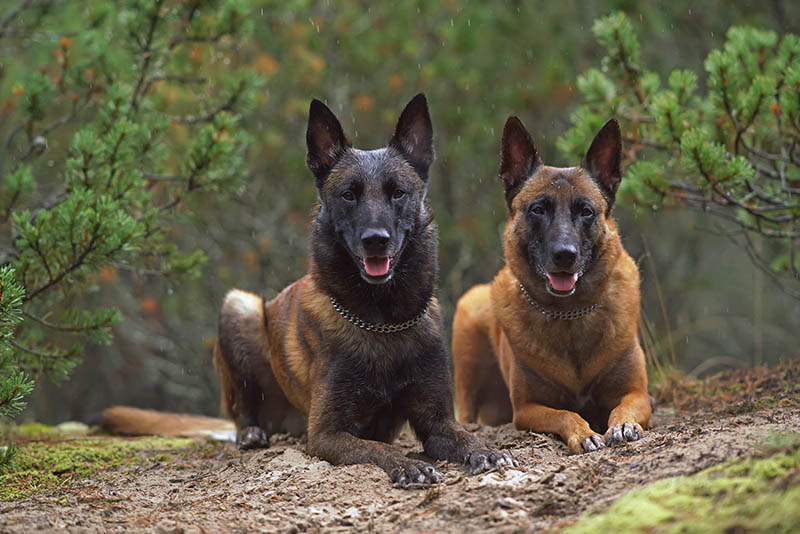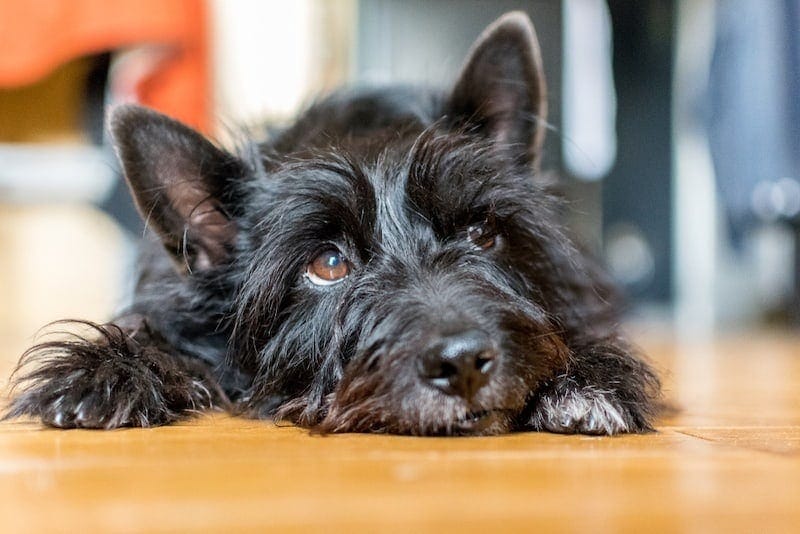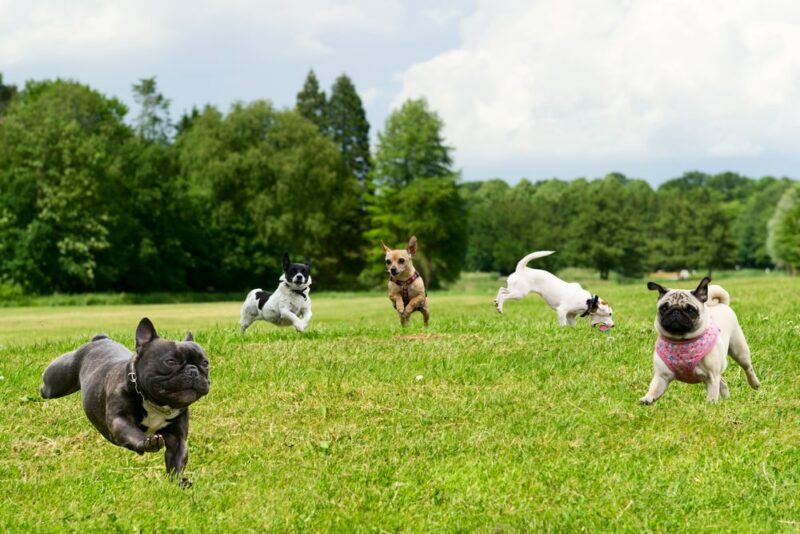Why is My Dog’s Poop Dry and Powdery? 9 Vet-Reviewed Reasons
Updated on
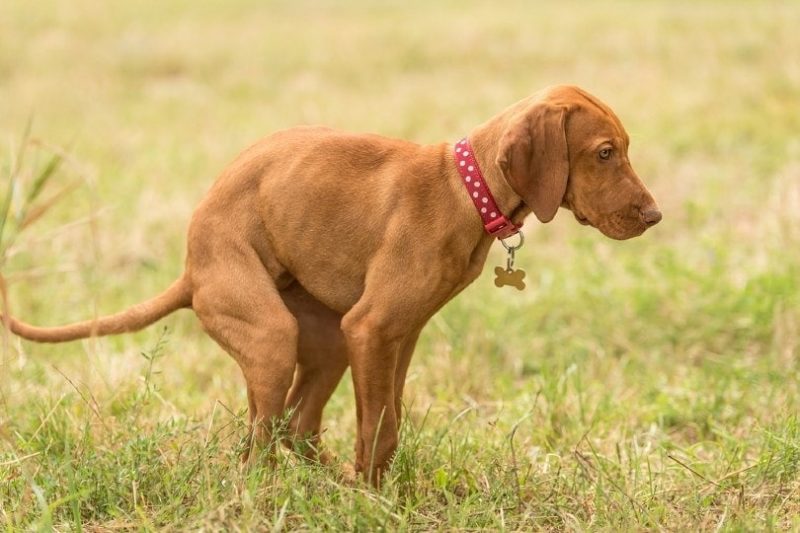
Dogs are mammals and as such, they go through the same basic bodily functions that humans do. One of these functions is the production and elimination of feces. Normally, dog feces are composed of bacteria, moisture, and fecal matter. We are used to dogs’ poop being wet and smelly. However, sometimes this mixture can become dry and powdery.
Dry, powdery dog poop is usually a sign that something has gone quite wrong with your dog’s digestion. There are a few reasons for this puzzling phenomenon. Read on to find out why sometimes dog poop can become drier than normal, what this can mean for the health of your dog, and what you need to do to treat the problem.
The 9 Reasons Your Dog’s Poop Is Dry and Powdery
1. Dehydration
Dehydration in dogs is a condition that results when the body doesn’t have enough water to function properly. Dogs may become dehydrated for a variety of reasons, mostly when their water losses exceed their intake. These can include excessive urination, diarrhea, vomiting, or heat-related illness. One common sign of dehydration is small and dry, sometimes powdery feces. Other signs of dehydration in dogs include a lack of energy, lethargy, dry mouth and tongue, and sunken eyes.
Constipation occurs when your dog is unable to poop. Dehydration typically causes constipation followed by other more serious health problems, such as kidney failure. If your dog has dry, powdery poops, make sure you watch their water intake, monitor their fluid losses, and contact your veterinarian immediately.

2. Your Dog Needs a Change in Diet
Dog feces depend mostly, and for obvious reasons, on their diet. The amount of fiber or the type of fiber in your dog’s diet can have an impact on your dog’s bowel movements and how long the feces are in the intestine. This will influence the shape, consistency, and moisture content of the stool. Feces that remain in the colon for a long time become drier, harder, and harder to pass.
Speak to your veterinarian about your dog’s diet before adding supplementary fiber—if your dog’s dry powdery poops are caused by something else, additional fiber may end up making the problem worse.
3. Your Dog Ate Something They Shouldn’t Have
Foreign body ingestion is another common cause of dry powdery poop in dogs. Gastrointestinal obstruction in dogs is a blockage in the stomach or the intestines that prevents the normal passage of food and feces. In many cases, obstruction is caused by a dog’s inability to pass poorly digestible, often firm matter such as garbage, hair, or bones mixed with feces. Dogs with bowel obstruction will often show symptoms such as vomiting, diarrhea, constipation, and lack of appetite. The feces may also become dry and powdery.
If left untreated, a bowel obstruction can lead to very serious health complications. Treatment for bowel obstruction depends on the cause of the obstruction but may include surgery, medications, or dietary changes.
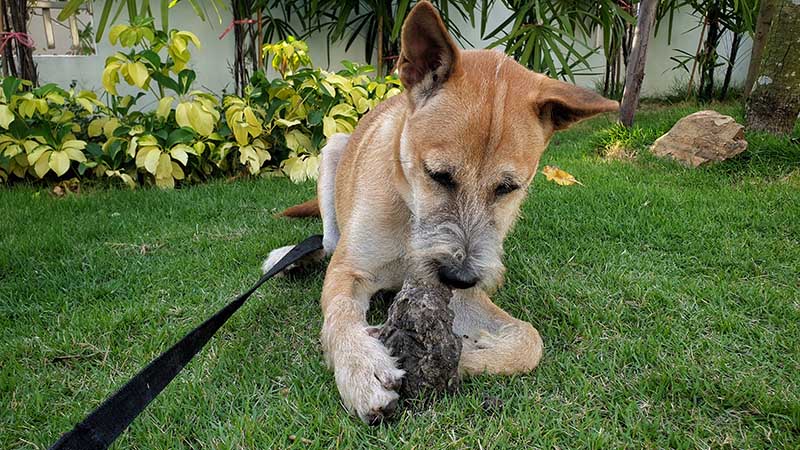
4. Your Dog Is on a Raw Diet
Raw meat-based diets consist of foods that are based on meat, bones, and offal that have not been cooked. These diets typically have a high protein and fat content and lower carbohydrate count. The feces of dogs fed raw meat-based diets are often described as firm, small, and powdery. If you have opted to feed your pup this type of diet, consult your veterinarian if your dog’s feces changes, as it may be considered completely normal.
5. Painful Elimination
Dogs may be reluctant to poop out of fear that it might cause them pain, and dry powdery poop can develop when they refuse to defecate. If your dog experiences pain when they go due to another issue, such as an anal gland inflammation, infection, anal furunculosis, colitis, or another medical condition, they might suppress their natural urge to poop.
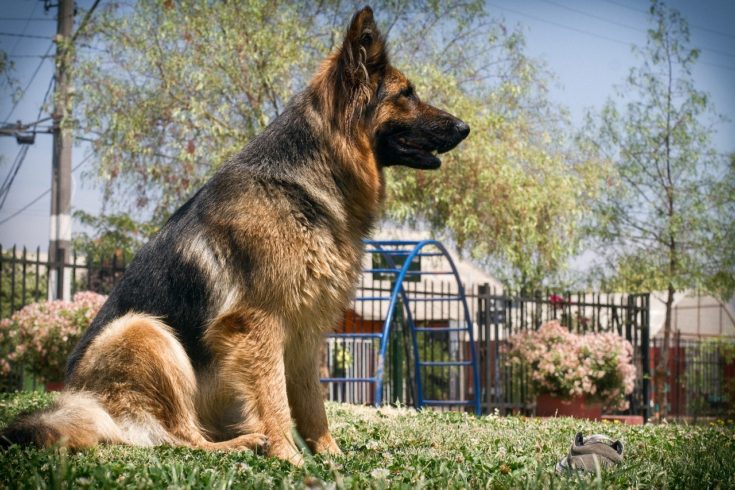
6. Your Dog May Have a Tumor
Symptoms of gastrointestinal tumor obstruction in dogs can include vomiting, loss of appetite, constipation, and lethargy. A gastrointestinal tumor is a mass or growth occurring in the intestine, making it difficult for your dog to poop, and resulting in dry and powdery stools. Treatment for a bowel obstruction usually includes surgery to remove the tumor or blockage. Without treatment, the dog may die from the obstruction.
7. Compression of the Colon
If something outside your dog’s bowels is pressing on them, this can slow down the transit of waste matter through their bodies. As your dog’s feces sit inside their bowel, their intestines keep removing water from them, eventually leading to crumbly, dusty feces. Things that could press on your dog’s guts include swollen lymph nodes, tumors, or in male dogs, an enlarged prostate.
Treatment depends on the cause of the compression but may involve surgery, antibiotics, antiinflammatories, and other medication.
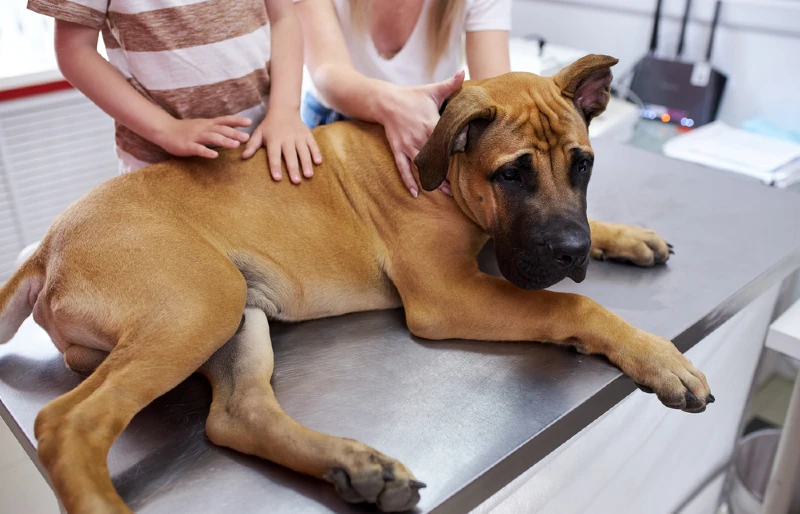
8. Neuromuscular Diseases
Dogs can suffer from a variety of neuromuscular diseases that can cause constipation leading to dry poop. These diseases interfere with the signals between the brain and muscles, resulting in difficulty moving stool through the intestines. This can lead to infrequent bowel movements, hard stools, and constipation. Some of these diseases include hypothyroidism, dysautonomia, spinal cord disease, and pelvic nerve dysfunction.
Dry, crumbly stools can be accompanied by other symptoms such as weakness, muscle atrophy, and difficulty walking. Treatment depends on the underlying disease but may include medications, diet changes, and exercise.
9. Medication
Dogs are often prescribed medication to help relieve symptoms of various conditions. However, one potential side effect of some medications that are commonly prescribed to dogs is constipation. These medications include but are not limited to opioids, corticosteroids, and diuretics. These medications have the potential to slow down the intestinal motility or increase fluid losses, which can lead to dry stools.
Powdery poops caused by these medications are usually temporary and go away once the dog stops taking the medication. However, make sure you always consult with your veterinarian if you notice any medication side effects on your dog.

 What Should I Do if My Dog’s Poop Is Dry?
What Should I Do if My Dog’s Poop Is Dry?
If your dog’s poop is dry, assess your dog’s other symptoms against the list above. Resolving powdery stools might be as simple as waiting a day and seeing it resolve naturally, or just adding more water to your dog’s diet. You should try to increase your dog’s water intake by adding more water to their food or providing them with fresh water throughout the day. Additionally, exercise will help your dog to move their bowels, so a long walk might be in order.
When Should I Take My Dog to the Vet?
If your dog’s poop continues to be dry after a day or two, you should consult your veterinarian to determine the underlying cause. As we have seen, dry poop can be a sign of various health problems, such as dehydration or intestinal obstruction. Treatment will vary depending on which underlying condition is present but may include intravenous fluids, antibiotics, or dietary changes.
If you can, remember to take a sample of your dog’s poop with you to the vet. A fecal sample will be examined for evidence of parasites, bacteria, and other abnormalities. The veterinarian may need to perform a fecal examination in order to determine the cause of the animal’s illness. This information can help the veterinarian to diagnose and treat your dog’s illness.
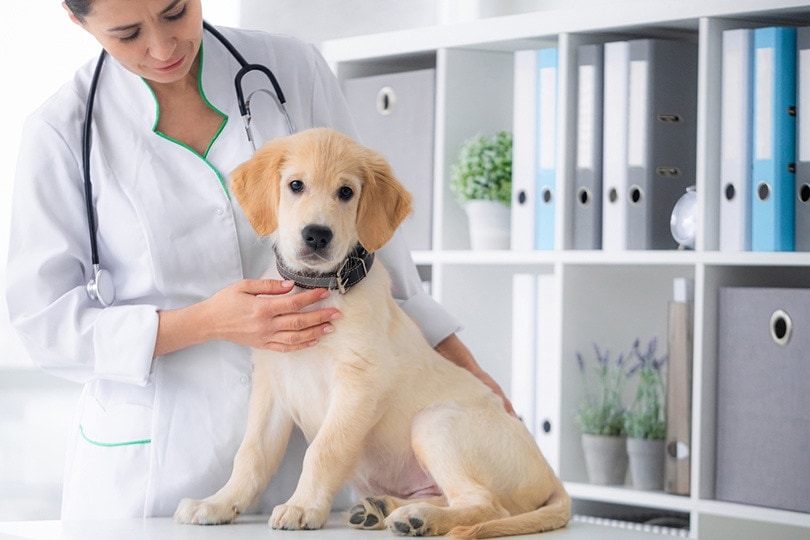
Conclusion
In conclusion, it is important to be aware of the causes of dry powdering stools in dogs, as it can be a sign of dehydration, foreign body ingestion, or an inadequate diet. If you notice your dog producing crumbly, dry stools over a number of days, take them to a veterinarian for an evaluation.
If your dog experiences this problem, you may need to increase their water intake, encourage exercise, or change their diet. You just need to follow your veterinarian’s advice to solve this problem for your furry friend.
Featured Image Credit: SasaStock, Shutterstock


